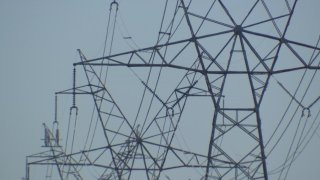
Senate debate on a climate and energy bill Thursday may coincide with the year's maximum demand for electricity.
There is a chance for demand on the New England power grid to climb to about 23.9 gigawatts between 6 p.m. and 7 p.m. Thursday, the Metropolitan Area Planning Council said in an alert telling municipalities to reduce their consumption in the afternoon and evening to save money on their electric bills. The organization runs a peak demand notification program in the summer months based on forecasts from grid operator ISO-New England.
WATCH ANYTIME FOR FREE
>Stream NBC10 Boston news for free, 24/7, wherever you are. |
The grid operator said in its morning report that it expects to have at least 1.083 GW of excess capacity available at the time of Thursday's peak demand. Demand maxed out at 22.8 GW Wednesday, ISO-NE said, and 2023's demand for electricity peaked at 23.475 GW between 5 p.m. and 6 p.m. on Sept. 7, a day that saw temperatures surpass 90 degrees with extreme humidity. The all-time record for demand in New England was set on Aug. 2, 2006, when it reached 28.13 GW after a prolonged heat wave.
During peak demand periods, dirtier fuels like oil are pressed into service so reducing demand during those times can have a greater impact on emissions displacement by limiting the use of high-emitting power generators.
Get updates on what's happening in Boston to your inbox. Sign up for our >News Headlines newsletter.
The Senate plans Thursday to vote on a package of reforms aimed at modernizing the electric grid to accommodate more energy from cleaner generation sources and tweaking how Bay Staters receive power (S 2829). The expansive bill touches upon clean energy project siting, electric vehicles, third-party electric suppliers, multistate procurement of clean energy, and utility rates.
"Today, we are here on the third day of record-breaking heat, and it's not even July. We are in a climate crisis. There is no doubt about it," Senate President Karen Spilka told reporters late Thursday morning.
On Thursday morning, 57% of the region's electricity generation came from natural gas, 18% from nuclear power, 9% was imported energy, 8% was renewable energy, and 5% was generated from oil, according to ISO-NE.
Politics
On Tuesday evening, ISO-NE declared a "Power Caution" after unexpected generation outages left the region short of meeting its operating reserve requirements, the organization said. The timing of the outages prevented additional resources from coming online in time for the evening peak, but the declaration was rescinded later Tuesday night when demand declined.
Sam Drysdale contributed to this reporting.



